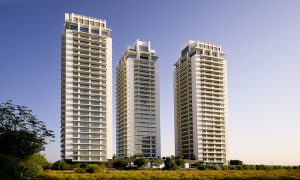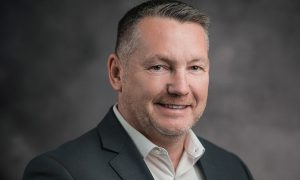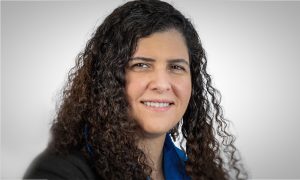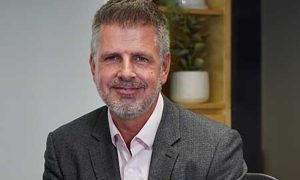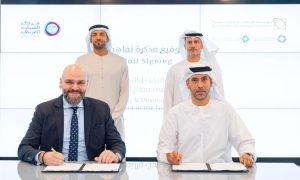Webinar: How digitalisation of the rental sphere works for equipment users and owners
Experts from online equipment rental marketplace Tenderd, along with Mobil and TÜV SÜD, explain the benefits of the platform for users and fleet owners

Maximising revenue and profitability, shifting the risk from ownership to usership and the present state of cash flow in the market are all factors that are driving rental as the more popular choice in the construction equipment market, the audience at a webinar hosted by digital equipment rental marketplace, Tenderd, learnt last month.
Tenderd is a technology company that supports the rental activities of entities that rent in or rent out their equipment through its online heavy equipment rental marketplace. The webinar, which was part of a series of such events hosted by the company featuring various partners in the equipment, rental and digital construction landscape, was compered by Suhail Masri, GM, Tenderd Saudi Arabia. The speakers at the online event were Yonas Tecle, head of operations at Tenderd; Philippe Dupin, GM at Mobil; and Muhammad Amin Zammam, branch manager, Dubai, at TÜV SÜD. Construction Machinery Middle East magazine and middleeastconstructionnews.com were the official media partners.
Introducing the speakers and the topics for discussion, Masri said that a survey by the American Rental Association at the beginning of the year found that at least 40-45% of contractors plan to rent as much as they did last year and 37% will rent more than they did last year. “The numbers are now no doubt affected by Covid-19 but at least we are fairly certain that the general trend is positive where rental is concerned.”
Describing Tenderd and its operations, he said: “We use technology to enable the entire supply chain from A-Z. The salient features of the current construction market are that construction activity is generally on the upswing; equipment rental is expected to expand approximately 30-40% over the next couple of years, and more dealers are getting in the equipment rental business.
“So what is driving rental as the more popular choice? I believe it is firstly cash flow and secondly shifting the risk from ownership to usership. Also, no matter what you rent – whether it’s heavy equipment, light equipment or even party equipment – the objective is to maximise your rental revenue. And this is our topic for today. We are here to discuss how we can increase our profitability and revenue of our fleets.”
Speaking about the rental sector and Tenderd’s operations in it, Tecle added: “Tenderd is a heavy equipment rental marketplace that offers reliable and secure ways for general contractors to rent in, rent out and manage construction equipment. Over the past few years, we have worked with hundreds of contractors in the UAE and in KSA from our fleet network of over 7,000 machines that include yellow plant, lifting equipment, light machinery and trucks.
“Our goal as Tenderd is to make it simple to manage heavy equipment fleets by digitising the most time-consuming steps in the construction market. Equipment is a vital part of the construction landscape and in terms of the total cost of a project, it ranges between 10% in civil structures to 80% in earthworks. By 2026 the global equipment rental market is expected to grow to $175bn, driven by an exponential increase in rentals and digitisation.
“Over the past 3-4 months the global market has taken a hit due to Covid-19 but thankfully it is recovering gradually. During this recovery period, specifically for contractors, it has made them think of changing the way they conduct business. With this in mind, we went out and asked contractors whether in the current economic climate they expect `to move your business towards an asset led model, i.e. renting more instead of buying equipment’. The result of our survey was a resounding 75% yes in favour of renting. More contractors are renting instead of buying, based on their project requirements.”
When the trend among contractors is more towards renting rather than buying, are equipment owners making a profit? To maximise profitability of a fleet the owner has to increase the return per month of his equipment – or maximise how much a piece of equipment has worked during the year. Raising these two parameters will lead to more profitability, Tecle explained.
“The questions is, how do we increase the utilisation rate of our equipment? The two critical parts of making this happen is to maintain the quality of your kit with preventive maintenance and to get access to more jobs.
“The data shows the average lifetime of a piece of equipment is between 6-15 years. What makes some equipment almost die at six years and others work fine for 15? Simply doing one of these trivial-looking activities, such as air filter cleaning and greasing, increases the lifetime of your equipment. When that happens, you are increasing its utilisation rate as well.”
Tecle added that utilisation is measured in the best and easiest way by using telematics, giving you not only the location of a unit but also accurately measuring its utilisation rate. In addition to that, “Tenderd users will also receive predictive maintenance alerts so you can take action before the machine breaks down”.
“For more technical details, Tenderd has separate free workshops available via our website with our highly qualified experts who have vast industry experience in the region.”
Tecle added that the other side of owning or operating equipment and fleets is the jobs that provide revenue. “How do you get more jobs? The best way to do it is going digital. No matter how experienced you are and how connected you may be, your access to more jobs is always limited by those connections. When you go digital, that increases the visibility of your fleet to thousands of potential clients by simply marketing your fleet online. The suppliers who have gone digital and worked with us have seen an increase in jobs coming their way. Just in the last few months, our suppliers have had access to more than $120m worth of business on the Tenderd fleet manager app.”
Going through the Tenderd process, he explained that new equipment managers get access to the Tenderd fleet by simply downloading the app from either Apple Appstore or Google Play and registering using their mobile number or email id. At this point they are unverified equipment suppliers. To get verified all that’s needed is to upload and submit some legal documents, such as trade licences, and also a fleet list so that Tenderd knows that the machines being enlisted with it is actually owned by the supplier.
“Once you upload and submit, it’ll take 24-48 hours to verify you as a supplier, after which you need to update your fleet to be more visible. To do that, go to the machines dashboard and find out the equipment you want to update, click on the equipment and either take a photo or update all the documents that are related to the equipment and simply update it. Once you do this you will have an enriched data on the marketplace.The last point is updating your current prices and availability, which can also be done on the machines’ dashboard. Find an equipment that you want to make visible, just toggle it ‘available for hire’. To update the price, simply click on the machine and update monthly, weekly or daily. And now you have gone digital. Contractors can pick up your equipment and give you more jobs because your machine has become a part of the online community in the marketplace.”
Speaking about the challenges of the present time in his remarks, Mobil’s Dupin said: “We are all facing both CAPEX and OPEX challenges at this time. We need to limit investments and also reduce costs. Simultaneously, maintenance is also very important to increase the life of equipment. But it is also a pain in the neck for fleet owners and operators as it costs money and is not easy to manage. And we believe as Mobil that there’s a lot of room for improvement and optimising maintenance costs might be a good way for you to reduce OPEX.
“How can Mobil contribute to your fleet productivity? We have been combining the expertise of two companies, Mobil and local service provider Massar Solutions, a well-known fleet management services company that provides end-to-end solutions. They have been here for a long time and have over 300 employees managing 16,000 pieces of equipment on the ground covering a very wide range of kit – from light vehicles and trucks to heavy vehicles, off-highway equipment and generators. They have over a thousand customers in the country.
“We believe that combining the expertise and technology of both entities is a great avenue to provide solutions towards reducing maintenance costs. How we do it is by proposing on-site solutions. We come to your site in our service vans and do what is required. But before we do that we will, though Tenderd, assess your fleet profile and make sure that we have the most suitable products for your equipment.
“We do this through a digital service book that is always kept updated. This tool is used by Massar as a second step to define the best service package for oil and filter change. We have a well-defined and practiced standard operating procedure that will let you know exactly what the jobs are that will be performed in the package and it will be agreed with a scheduled time. Down the road, we believe that there is lot of value in inspecting equipment on a regular basis, such as spotting any potential damage or pre-empting an impending breakdown. Of course, on the customers’ request we can also do additional service on the machines.”
Inspecting equipment and certifying them is the work of the third company that was part of the webinar – TÜV SÜD. Dubai branch manager Zammam explained that the company does third party safety inspection, certification and training for fleets, certifying more than 150,000 pieces of equipment over 75,000 operators per year in the region.
He gave the examples of Sharjah-based Al Marwan, a reputed equipment rental house in the entire region. “They recently celebrated a milestone with one of their Volvo dumpers, which completed a million kilometres of running without any failure. This is made possible by very efficient maintenance, inspection and certification, and I’m happy to inform that we have been doing the inspection and certification for them for 13 years now. This only highlights how important the inspection, certification and training are for fleets and operators.”
Citing the benefits of inspection and certification, he added: “Early detection of defects and malfunctions leads to cost reduction and effective maintenance, It reduces downtime of the machinery and increases efficiency and overall maximisation of fleet profitability. Also, inspected and certified units lead to safer operations and reduction in complaints from customers in general.
“When it comes to operator training, the reason it is necessary is that on most projects no operations are allowed without certified operators. It has been found that 85% of job-sites accidents are caused by unsafe operating practices. Also, trained and certified operators also reduce fuel consumption and are less likely to cause equipment breakdowns. The more competent the operator, the less the fuel consumption and the less the strain on the machine.
“We offer training for all sorts of equipment, from earthmoving to lifting machinery. For example, we do a two-day course for safe mobile crane operation for crane operators with valid heavy machinery licences in the UAE or Saudi Arabia.The course structure and results of operators are all shared with the client or fleet owner to enable him to know what knowledge has been imparted and what his operator has achieved. After each training, there is an examination as per the regional regulations, after which we award certificates.
“For inspection, all our engineers are senior people with not less than seven years of experience, and many with over 15 years of experience. Our engineers are equipped with the right tools for the job along with a checklist that is tailored for the particular class or sort of equipment they are inspecting. We also provide this checklist to the client so that everyone is on the same page on what we are going to inspect, test and certify. In general, we collaborate 100% with Tenderd and all its clients and also offer special discounts to Tenderd customers.”
More information on the services of Tenderd, Mobil and TÜV SÜD will be available in a detailed article on the webinar in the September issue of Construction Machinery Middle East.












